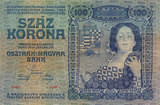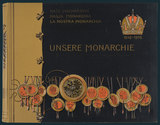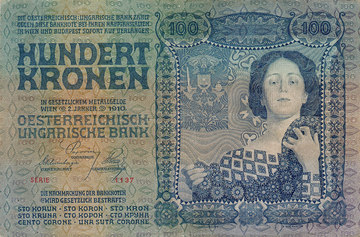Avstrija, Rakousko, Ausztria, Аустрија, ... The question of the language of the state
-

100 Krone banknote, 1910 (Hungarian side); designed by Kolo Moser
Copyright: Geldmuseum der Österreichischen Nationalbank
Partner: Geldmuseum der Oesterreichischen Nationalbank -

Cover of the book “Unsere Monarchie” edited by Julius Laurenčič, Vienna 1898
Copyright: Schloß Schönbrunn Kultur-und Betriebsges.m.b.H./Fotograf: Alexander E. Koller
Partner: Schloss Schönbrunn Kultur- und Betriebsges.m.b.H.
The variety within the Habsburg Monarchy gave outsiders the impression that Austria-Hungary was a modern Tower of Babel. The hotly discussed question of an official language of the state was complicated by the difference in the way the two halves of the Empire developed after the 1867 Compromise.
In Hungary, which followed the principle of the indivisible Hungarian nation that extended to all citizens of the country irrespective of their individual ethnic origin, Hungarian was the language of the state. The other languages of the multi-ethnic country such as Slovakian, German, Romanian, Serbian or Ruthenian merely enjoyed the status of minority languages and were only treated as equal to Hungarian to a limited extent. The sole exception was Croatian, since the Croats of Croatia and Slavonia enjoyed partial autonomy.
It was only at the regional level of Comitat administration and in local government authorities that other languages were permitted as languages of the administration alongside Hungary. The churches also had a degree of certain freedom, being able to decide autonomously on language rules for their administrative purposes. However, these provisions were never implemented in entirety and were subsequently watered down by statutory changes, with the result that the other languages were increasingly marginalised by the forced magyarisation policies of the Hungarian state.
In Bosnia-Herzegovina, the language of the state was Serbo-Croat, the old Austrian administration not distinguishing between Croatian, Serbian and Bosnian.
In the Austrian half of the Empire, although German was the dominant language, it was never the official language of the state. Attempts to this effect by German liberals were blocked by the non-German members of the Imperial Diet. The compromise solution of giving German the status of intermediary language – which would have corresponded with reality and would have been accepted by the representatives of the other languages – was in turn rejected by the German-speaking Austrians.
The consequences of the undefined status of German are also apparent in the standing orders of the Austrian Imperial Diet. The members were entitled to speak in their own mother tongue, which was a question of prestige. De facto, however, German was the language of discussion and thus shorthand records were only made of the speeches made in German.
Overall, the languages of the eight constitutionally recognised nationalities in the Austrian half of the Empire were regarded as the languages of the state. In addition to German, these were Italian, Poland, Romanian, Ruthenian, Serbo-Croat, Slovene and Czech.
At the level of local administration of the individual Crown Lands, a distinction was made between the language of the Land and the customary languages. In each Crown Land, there was a first and possibly a second language of the Land, which had the status of the language of the administration. As needs be, further languages could also be recognised as customary, but were only of local significance.
German was recognised as a language of the Land and hence an official language in all Crown Lands with the exception of Dalmatia and de facto also Galicia (as a result of Polish local autonomy).
As a rule, the language of the majority population was regarded as the first language of the Land. It was only in Bohemia and Moravia that German and not Czech was the first language, although Czech accounted for the majority in both Lands. This fact was regarded as gross discrimination by the Czech national movement and gave rise to a dispute that occupied the Habsburg Monarchy for decades, gave rise to a number of government crises and was never really solved.
Translation: David Wright
Gogolák, Ludwig: Ungarns Nationalitätengesetze und das Problem des magyarischen National- und Zentralstaates, in: Wandruszka, Adam/Urbanitsch, Peter (Hrsg.): Die Habsburgermonarchie 1848–1918, Band III: Die Völker des Reiches, Wien 1980, Teilband 2, 1207–1303
Hoensch, Jörg K.: Geschichte Böhmens. Von der slavischen Landnahme bis ins 20. Jahrhundert, München 1987
Křen, Jan: Die Konfliktgemeinschaft. Tschechen und Deutsche in den böhmischen Ländern 1780–1918 (Veröffentlichungen des Collegium Carolinum 71), München 1995
Stourzh, Gerald: Die Gleichberechtigung der Nationalitäten in der Verfassung und Verwaltung Österreichs 1848 bis 1918, Wien 1985
Wolf, Michaela: Die vielsprachige Seele Kakaniens. Übersetzer und Dolmetscher in der Habsburgermonarchie 1848 bis 1918, Wien u. a. 2012



